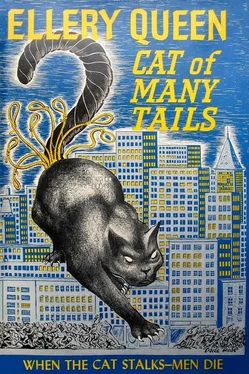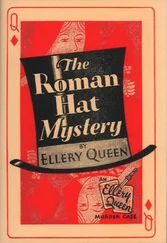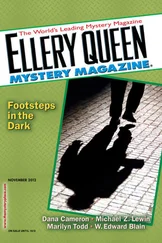But Ellery’s mind was a machine. The unselective evidence of his senses stoked it, and after a while out came a product.
Tonight’s production, by a squirrel instinct, Ellery stored away, sensing a future need.
The girl herself told him nothing. He could see what she might have been, but only from a photograph; the flesh, hardened at the supreme moment of the struggle not to die, was the usual meaningless petrifaction. She had been small and cuddlesome, with soft brown curly hair. Her nose was saucy and her mouth — from the photograph — had been pettish. She was manicured and pedicured and her hair had been recently set. The lingerie under her pongee negligee was expensive. The book she had been reading at the pounce of the Cat was a tattered reprint of Forever Amber. The remains of an orange and a few cherry pits lay on the inlaid occasional table beside the chaise. On the table also were a bowl of fruit, a silver cigaret box, an ashtray with fourteen lipstick-tipped butts in it, and a silver table lighter in the shape of an armored knight. In the withering lividity of death the girl looked 50; in the photograph, a recent one, untouched 18. She had been 25 and an only child.
Ellery dismissed Lenore Richardson as a regrettable intrusion.
The living told no more.
They were four: the father and mother of the murdered girl; the girl’s aunt — Mrs. Richardson’s sister — Mrs. Cazalis; and the eminent Dr. Cazalis.
There was no family fellowship in their grief. This Ellery found stimulating, and he studied them carefully one by one.
The mother passed what was left of the night in uncurbed hysterics. Mrs. Richardson was a superb woman of middle age, rather too fashionably gowned, and overjeweled. Ellery thought he discovered in her a chronic anxiety, unrelated to her sorrow; like the frown of a colicky infant. She was apparently the kind of woman who hoards life like a miser. The gold of her youth having tarnished, what little remained she kept gilding and packaging in extravagant self-delusion. Now she writhed and shrieked as if, in losing her daughter, she had found something long mislaid.
The father, a gray little rigid man of 60, looked like a jeweler, or a librarian. Actually, he was the head of Richardson, Leeper & Company, one of the oldest wholesale drygoods houses in New York. Ellery had passed the Richardson, Leeper & Company building often in his prowls about the City. It stood nine stories high on half a square block on Broadway and 17th Street. The firm was known for its old-fashioned merchant virtues: sternly nonunionized, run on the benevolent-patron system, with employees who tottered comfortably, along in the traces until they dropped. Richardson would be unswervingly honest, unalterably stubborn, and as narrow as a straight line. This was all quite beyond him. He could only sit by himself in a corner glancing bewilderedly from the tormented woman in the evening gown to the tumbled little mountain range under the blanket.
Richardson’s sister-in-law was much younger than his wife; Ellery judged Mrs. Cazalis to be early-fortyish. She was pallid, slender, tall, and self-contained. Unlike her older sister, she had found her orbit; her eyes went often to her husband. She had a submissive quality Ellery had found frequently in the wives of brilliant men. This was a woman whose marriage was the sum of existence to her, in a pitifully arithmetic way. In a society composed largely of Mrs. Richardsons, Mrs. Cazalis would tend to have few friends and few social interests. She comforted her middleaged sister as a mother might soothe a child in a tantrum; it was only during Mrs. Richardson’s wilder vocalisms that the younger woman’s ministrations took on an edge of rebuke and resentment. It was as if she felt herself cheapened and cheated. There was a virginal, unthawed sensitivity in her, a chill delicacy of feeling, which recoiled from her sister’s exhibitionism.
It was during one of these moments that an amused male voice said in Ellery’s ear, “I see you’ve noticed it.”
Ellery turned quickly. It was Dr. Cazalis, big and stoop-shouldered and powerful, with cold milky eyes and masses of icegray hair; a glacier of a man. His voice was deliberate and carried a musical undertone of cynicism. Ellery had heard somewhere that Dr. Cazalis had an unusual history for a psychiatrist; meeting the man for the first time, he was disposed to acceptance of the report. He must be 65, Ellery thought, possibly older; in semi-retirement, taking only a few cases, chiefly women, and those on a selective basis — it all added up to failing health, the declining phase of a medical career, the coronary age; and yet Dr. Cazalis seemed, aside from a certain restlessness of his large thick surgeon’s hands, a vigorous and functioning personality; certainly not a man to spare himself. It was a puzzle, not the less interesting for its irrelevance. His rather encyclopedic eyes were unavoidable. He sees everything, thought Ellery, and he tells exactly nothing; or what he tells is automatically conditioned by what he thinks his hearer ought to know.
“Noticed what, Dr. Cazalis?”
“The difference between my wife and her sister. Where Lenore was concerned, my sister-in-law was criminally inadequate. She was afraid of the child, jealous and overindulgent. Alternated between pampering and screaming at her. And in the sulks ignored Lenore entirely. Now Della’s in a panic overwhelmed by feelings of guilt. Clinically speaking, mothers like Della wish for the death of their young and when it happens they set up a terrified howl for forgiveness. Her grief is for herself.”
“It seems to me Mrs. Cazalis is as aware of that as you are, Doctor.”
The psychiatrist shrugged. “My wife’s done what she could. We lost two babies in the delivery room within four years of our marriage and Mrs. Cazalis was never able to have another. She transferred her affections to Della’s child and it compensated each of them — I mean my wife and Lenore — for her own lack. It couldn’t be complete, of course; for one thing, the biological but otherwise inadequate mama is always a problem. Essentially,” said the doctor dryly, glancing over at the sisters, “essentially unsatisfactory even in mourning. The mother beats her breast and the aunt suffers in silence. I was rather fond of the little chicken,” said Dr. Cazalis suddenly, “myself.” He walked away.
By 5 A.M. they had the facts orderly. Such as there were.
The girl had been home alone. She was to have accompanied her father and mother to a party in Westchester at the home of one of Mrs. Richardson’s friends, but Lenore had begged off. (“She was due for her menses,” Mrs. Cazalis told Inspector Queen. “Lenore always had a hard time. She told me in the morning over the phone that she wouldn’t be able to go. And Della was cross with her.”) Mr. and Mrs. Richardson had left for Westchester shortly after 6 o’clock; it was a dinner party. One of the two domestics, the cook, was away for the holiday, having left Saturday afternoon to visit her family in Pennsylvania. The other, a maid, had been given the night off by Lenore herself; since she did not sleep in, she was not expected until morning.
The Cazalises, who lived eight blocks away, at Park Avenue and 78th Street, had been worried about Lenore all evening. At 8:30 Mrs. Cazalis had telephoned. Lenore had said she was “in the usual crampy dumps” but otherwise all right and that her aunt and uncle were not to “throw fits” about her. But when Mrs. Cazalis learned that Lenore had characteristically failed to eat anything, she had gone over to the Richardson apartment, prepared a warm meal, forced Lenore to eat it, made the girl comfortable on the chaise in the living room, and had spent perhaps an hour with her niece afterward, talking.
Читать дальше












